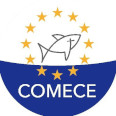COMECE and Katholisches Büro express concerns over EP SoHO Regulation Draft
The Commission of the Bishops’ Conferences of the European Union (COMECE) and the Katholisches Büro in Berlin are jointly releasing a statement on Tuesday, September 12, 2023, expressing their deep concerns about the draft of the European Parliament’s position on the SoHO Regulation. This regulation will set the fundamental curse for future handling of prenatal human life in European transplantation and pharmaceutical legislation.
The members of the European Parliament are called to vote on the draft and tabled amendments prepared by the ENVI Committee concerning the future Regulation on “Quality and safety standards for substances of human origin intended for human use” – also known as SoHO Regulation.
The Secretariat of COMECE, in collaboration with the Katholisches Büro in Berlin, expresses profound concerns about the potential consequences of the broad definition of ‘human substance’ outlined in the draft, which could include human embryos and foetuses.
“The danger lies in the possibility that such a definition may degrade the dignity and value of human life, creating an unacceptable equivalence between embryos and foetuses and simple skin cells or blood plasma”, Fr. Manuel Barrios Prieto, Secretary General of COMECE, explains.
Furthermore, the joint statement raises questions about Article 58 of the draft. If approved, this article would permit and mandate preliminary genetic testing on embryos and foetuses, potentially paving the way for life selection and raising concerns about compatibility with the right of self-determination for both donors and recipients.
Lastly, COMECE and the Katholisches Büro in Berlin underscore the need for greater clarity in the draft concerning the rights of individual EU Member States to regulate this highly ethical field. The statement emphasises that “it must remain possible for each Member State to refuse the authorisation of a SoHO preparation [and also] its recognition“.
Once approved by the European Parliament, the text will serve as the institution’s position in preparation for upcoming trialogue negotiations with the European Commission and the Council of the European Union.



